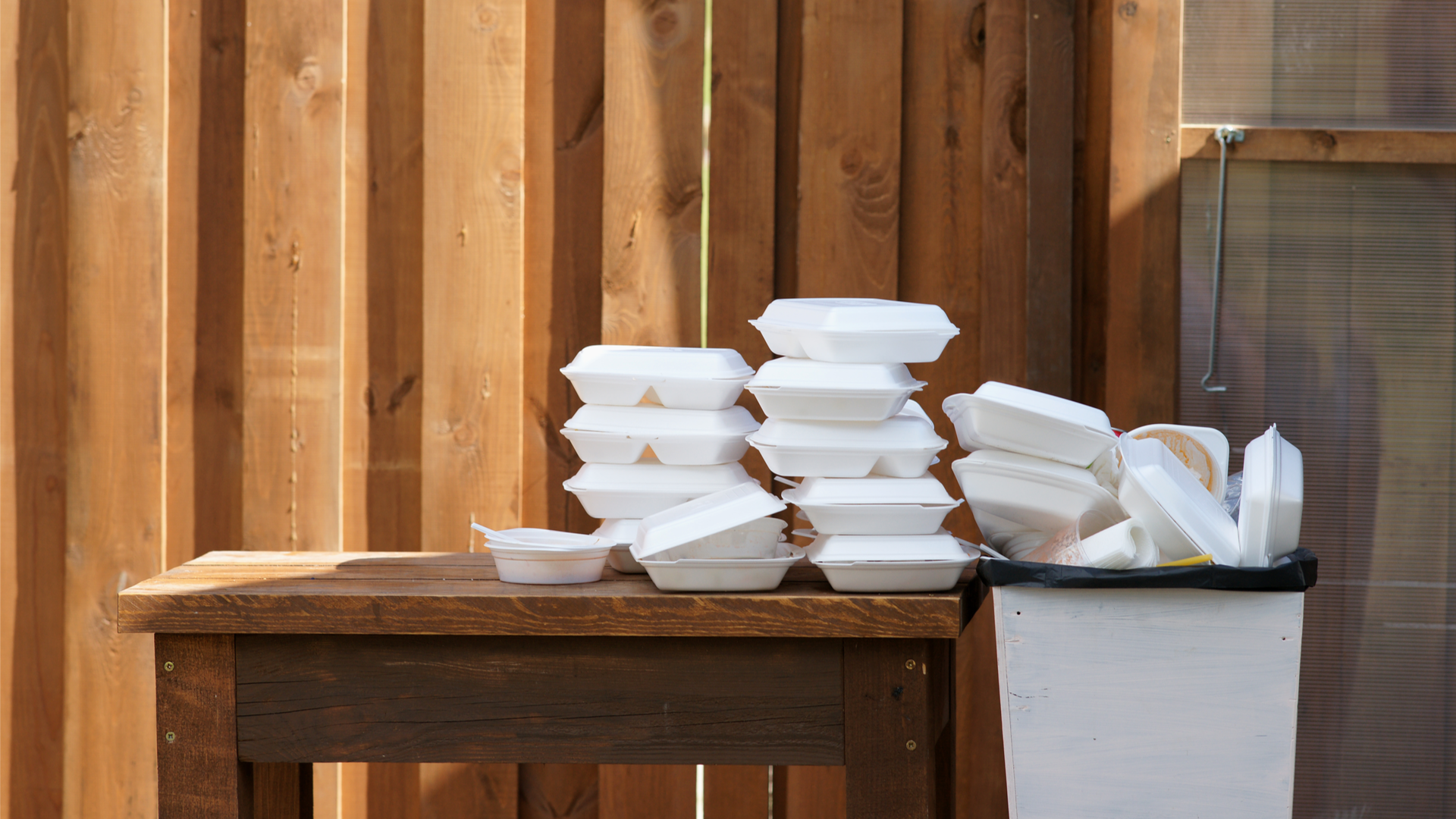Policy Name: Ban on Polystyrene (Styrofoam) Food and Beverage Containers in Contra Costa County, California
Overview: The Contra Costa County Board of Supervisors has voted unanimously to ban the use of polystyrene (also known under the brand name Styrofoam) in food and beverage containers, effective May 1, 2020. Exemptions include prepackaged foods, raw meat trays, and reusable coolers. Replacements for the polystyrene containers must be made of recyclable materials.
Location: Contra Costa County, California
- Encompasses 19 cities and towns in the San Francisco Bay Area
- County Seat: Martinez, CA
- Largest City: Concord, CA
- Population: 1.15 million
Food Policy category: Food Safety
Program goals: To eliminate the use of polystyrene food and beverage containers throughout Contra Costa County replace them with environmentally-friendly food-service ware.
How it works: Food vendors in Contra Costa County will have six months to replace all polystyrene food wares, i.e. products used to serve or transport food and beverages, with recyclable single-use products or reusable products made of ceramic, metal, glass, or porcelain. For now, the ordinance does not call for compostable replacement products, as some jurisdictions in Contra Costa do not have compost waste collection services.
Enforcement is expected to cost about $25,000, which will come from the county’s stormwater utility assessment funds.
Progress to date: It is still too early to report any progress.
Why it is important: Styrene, the building block for polystyrene, is now classified by the World Health Organization as a probable carcinogen, yet it is still commonly used in food and beverage containers, including bowls, plates, cups, take-out containers, and trays. Styrene can leach into food and beverages, particularly when the food is at warmer temperatures. According to the Environmental Protection Agency (EPA), long-term exposure to styrene can have negative effects on the central nervous system in humans, including:
- headaches
- fatigue
- weakness
- depression
- hearing loss, and
- peripheral neuropathy.
Polystyrene is not biodegradable, and because it is such a lightweight material, it can be carried easily by the wind and pollute the environment. Polystyrene also crumbles easily into small pieces, making it likely that fish and animals will ingest it; in turn, it can make its way back into the human food system.
Because many reusable, recyclable, and/or biodegradable alternatives to polystyrene food containers already exist, a ban on polystyrene should not create a burden for food vendors, and it may help to both improve the health of Contra Costa residents and clean up the environment.
Program/Policy Initiated: The ordinance passed on Tuesday, September 24, through a vote of the Contra Costa County Board of Supervisors; it is expected to be adopted by the Board on October 8. The ban will take effect on May 1, 2020, to allow food vendors six months to deplete their current supplies of polystyrene products.
Point of contact:
- Name: Michele Mancuso
- Email: Michele.Mancuso@pw.cccounty.us
- Telephone: 925-313-2236
Similar Practices:
- Berkeley, California was the first locale to ban polystyrene in 1987.
- Maine became the first state to announce a polystyrene ban in May 2019, going into effect in 2021. Maryland and Connecticut have also approved legislation to ban the material.
- New York City is the largest city to ban polystyrene. Mayor Bill de Blasio implemented a polystyrene ban in January 2019, and enforcement went into effect in July 2019. Violations of the ban result in a $250 fine for the first offense, $500 for the second, and $1,000 for the third and beyond.
- More than 200 other US communities have committed to a polystyrene ban, as well as companies like McDonald’s and Dunkin’ Donuts.
- Countries that have banned polystyrene or that are in the process of banning it include India, Zimbabwe, Antigua and Barbuda, Guyana, Saint Vincent and the Grenadines, Jamaica, Grenada, Saint Lucia, Dominica, Saint Kitts and Nevis, and Saint Maarten.
Evaluation: Evaluation of this policy has not begun, as the ban has not yet been officially adopted and will not be in full effect until May 2020.
Learn more:
- Styrene (Agency for Toxic Substances and Disease Registry)
- Uptake and Accumulation of Polystyrene Microplastics in Zebrafish and Toxic Effects in Liver (Environmental Science and Technology)
- Dealing with Polystyrene Wastes (EcoMENA)
References:
- Berkeley Widens Ban on Foam Food Containers (LA Times)
- Contra Costa County Bans Polystyrene Food and Beverage Containers (East Bay Times)
- Contra Costa County Bans Polystyrene Food, Beverage Containers (NBC Bay Area News)
- Contra Costa County is Proposing to Ban Styrofoam (Contra Costa County)
- Contra Costa Proposed Ordinance (Contra Costa County)
- Global List of Countries with Plastic and/or Styrofoam Bans (Bahamas Government)
- It’s Time to Say Goodbye to Plastic Foam Cups and Containers (The Public Interest Group)
- Leaching of Styrene and Other Aromatic Products in Drinking Water from PS Bottles (Journal of Environmental Sciences)
- Maine Becomes the First State to Ban Styrofoam (CNN)
- New York Will Start Enforcing Its Styrofoam Ban Today (CNN)
- States Declare War on Styrofoam – “People Think it Breaks Down” (CBS News)
- Styrene and Styrofoam 101 (Safer Chemicals)
- Styrene Hazard Summary (Environmental Protection Agency)
- World Health Organization Finds Increased Cancer Risk for Chemical Found in Plastics (U.S. Public Interest Research Group)


